Iranian President Continues Anti-Israel Warnings
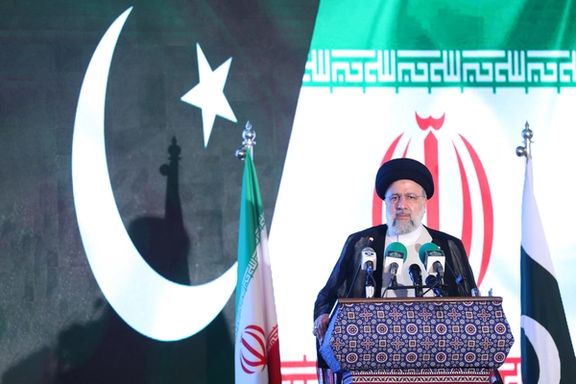
During a visit to Pakistan, Iranian President Ebrahim Raisi issued a warning suggesting that any further Israeli attacks on Iranian soil could lead to the elimination of Israel.

During a visit to Pakistan, Iranian President Ebrahim Raisi issued a warning suggesting that any further Israeli attacks on Iranian soil could lead to the elimination of Israel.
"This time, the nation of Iran has punished Israel," Raisi stated, referring to the recent aerial bombardment which saw 350 projectiles launched towards Israel, though almost all were intercepted by Israel and a US-led coalition. "If Israel makes another mistake and attacks Iranian soil, the situation will be different, and it is uncertain if anything will remain of that country," he added.
The visit follows recent tensions highlighted on Friday when explosions were heard over Isfahan in central Iran. Sources attributed them to an Israeli attack, though Tehran downplayed the severity of the incident and indicated no immediate plans for retaliation. Israel is believed to have targeted air defenses for Iran's two nuclear sites.
On April 13, Iran responded to a suspected Israeli strike on its consulate in Damascus which had killed a senior Quds Force commander and several IRGC personnel.
In his speech in Lahore, aiming to repair ties between Iran and Pakistan after ongoing border clashes, President Raisi also stressed Iran's continued support for the Palestinian resistance, positioning it as a matter of “national honor.”
Raisi, who began a three-day visit to Pakistan on Monday, emphasized his commitment to increasing bilateral trade between the two nations to $10 billion annually.

Israeli airstrikes in southern Lebanon have killed two high-ranking members of Iran-backed Hezbollah militant group.
A video released by the Israeli army on Tuesday showed a strike on a car driving in Aadloun in southern Lebanon, which the army said killed a "significant operative in the Hezbollah's aerial defence unit."
Hezbollah confirmed the death of one of its fighters, Hussein Azqul (Azkoul). Israel describes hims as “central terrorist” in Hezbollah’s air defense unit while sources close to the group said he was an engineer in Hezbollah's aerial defence units and that he had been active in Hezbollah's field operations.
Azqul, according to the IDF, was “heavily involved in the activities of the [air defense unit] and took part in the planning and execution of a variety of terror activities.”
A separate Israeli strike overnight Monday (April 22) to Tuesday killed Muhammad Attiya, a member of the aerial unit of Hezbollah's elite Radwan Forces, the IDF said.
Hours after the strike, Israel intercepted several drones over its northern coast. Drone infiltration sirens were triggered in Nahariya, Acre, and other northern areas, with the IDF neutralizing three drones believed to be carrying explosives.
The ongoing skirmishes have led to the evacuation of approximately 70,000 residents from northern Israeli communities amid daily attacks from Hezbollah and other Iran-backed forces.
Last week, the Israeli military confirmed the death of a senior Hezbollah commander, Ismail Yousef Baz, in an airstrike. According to IDF reports, Baz was involved in orchestrating and executing rocket and anti-tank missile attacks against Israel from Lebanon's coastal regions.
Hezbollah, supported by Iran and allied with groups such as Hamas and Palestinian Islamic Jihad, has escalated its aggressive actions against Israel.
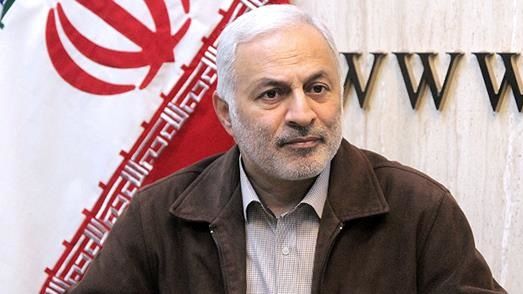
Vahid Jalalzadeh, the head of Iran's National Security and Foreign Policy Commission, has criticized Jordan's recent role in intercepting Iranian drones destined for Israel.
The incident, which took place on April 13, saw Jordan's air force joining a US-led coalition downing Iranian drones that violated its airspace, part of an aerial bombardment of over 350 drones and missiles aimed at Israel.
Jalalzadeh argued that Jordan must be held accountable for its actions, which he views as antagonistic toward Iranian interests.
In a covert threat to Israel's allies, he also warned that If Israel utilizes facilities from regional countries and American bases against Iran, there will be a military response. Jordan was among multiple nations including the US, UK and France, involved alongside Israel in defending itself from the unprecedented air assault.
Iran claimed the barrage was in response to an alleged Israeli air strike at the start of the month in which a senior Quds Force commander was assassinated and multiple other high ranking members of the IRGC were killed.
According to a statement from the Jordanian cabinet the day following the incident, Jordan intercepted several airborne objects that had entered its airspace to safeguard the safety of its citizens. “Some shrapnel fell in multiple places during that time without causing any significant damage or any injuries to citizens,” it added.
Jordan, which borders Iranian proxy strongholds Syria and Iraq, increased its defensive measures by requesting the deployment of Patriot air defense systems from the US last year.
The latest developments come amid reports of increased US military aid to Jordan, which hosts hundreds of American troops conducting regular exercises with the Jordanian army.
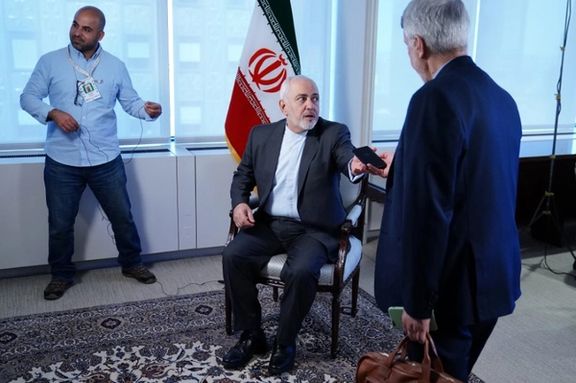
The International Crisis Group has retained Mercury Public Affairs to lobby on its behalf, according to filings alerting the US Justice Department.
The registration, filed on March 7, 2024, marks the first time the think-tank has reported lobbying activities in Washington since the first quarter of 2015.
The move follows just months after an extensive investigation by Iran International revealed that the Crisis Group signed an undisclosed deal with the Iranian government in 2016.
Another Iran International expose, published in September 2023, based on thousands of emails from Iranian diplomats, showed that three current and former Crisis Group members were part of the Iran Experts Initiative (IEI), established by the Iranian foreign ministry in 2014 to extend Tehran's soft power.
This network was active while the Crisis Group was attempting to shape US policy on Iran during and after the negotiations for the 2015 nuclear deal that the Obama administration negotiated with Tehran.
The Crisis Group did not answer specific questions on whether the move to hire Mercury was made in direct response to Iran International’s reporting.
“To help achieve our mandate, we have partnered with Mercury to assist Members of Congress from all political parties who want to meet with our analysts who work in conflict zones across the globe,” the Crisis Group’s Elissa Jobson told Iran International in an email statement.
Documents show that Patrick Costello, the firm’s Senior VP in its Washington DC office, will work on the account for Mercury.
According to the firm’s website, Costello is “part of the bipartisan federal lobbying team and leads the NGO/Think-Tank engagement practice” and is a seasoned expert in US foreign policy and national security.
In a subsequent filing, for the first quarter of 2024, the income related to lobbying activities listed was $20,000, for addressing issues related to foreign relations, with efforts directed towards both the US Senate and the US House of Representatives.
In response to inquiries regarding the specific funding source for the lobbying activities, and whether Qatar, one of the NGOs donors, will contribute financially to the lobbying efforts on its Iran file, Jobson told Iran International, “all fees and services provided are publicly disclosed, and Qatar has no role, financial or otherwise, in the engagement.”
The Brussels-based NGO previously rejected Iran International’s reporting, saying that it “mischaracterizes Crisis Group’s mandate and methodology” and that “these accounts distort the nature of the meetings” between its members and the Iranian government.
In its joint reporting with Semafor, Iran International also said that in 2016 the Crisis Group established a formal Memorandum of Understanding (MOU) with the inhouse think tank of the foreign ministry of Iran, the Institute for Political and International Studies (IPIS), but never publicized it.
Following Iran International’s and Semafor investigations, three Republican lawmakers have asked the US Department of Justice to investigate the Crisis Group for potential violations of the Foreign Agents Registration Act (FARA).
FARA mandates that any individuals or organizations representing foreign entities in a political capacity must register their affiliations and activities with the Department of Justice. Established in 1938, the law does not necessitate funding from a foreign government for registration. Instead, it concentrates on efforts to influence the media, Congress, or government officials.
In their letter to US Attorney General Merrick B. Garland, the members of Congress say the Crisis Group has undisclosed ties and a formal relationship with the government of Iran, specifically pointing to the 2016 Memorandum of Understanding.
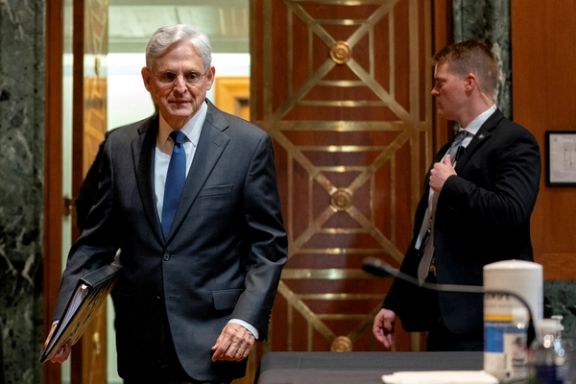
“There is a clear pattern of behavior indicating that the Crisis Group is in fact not an independent organization, but a chief mouthpiece of the Islamic Republic of Iran in the United States. Given this evidence, we urge you to launch an investigation of the Crisis Group without delay for potential FARA violations to protect our nation from malign foreign influence,” the letter said, signed by Jim Banks of Indiana, Elise Stefanik of New York, and Mike Waltz of Florida.
The lawmakers also referred to President Joe Biden’s special envoy on Iran, Robert Malley, who has been placed on leave while his security clearance is reviewed – reportedly for disqualifying personal conduct and mishandling of classified information. The exact cause of his suspension remains unclear.
Earlier this year, the State Department’s Inspector General opened an internal investigation into the steps leading up to and after Malley’s suspension.
Malley, who ran the Crisis Group during Donald Trump’s presidency, worked closely with the three Iran experts who were members of the influence network formed and guided by Tehran.
The IEI members simultaneously worked for top Western think tanks and gave advice to the US and Europe.
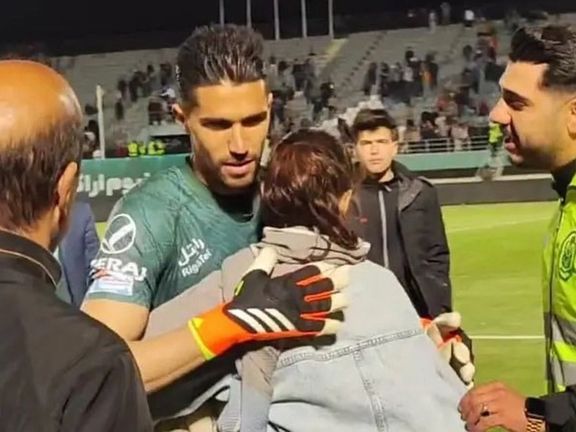
Hossein Hosseini, the captain of Iran’s Esteghlal FC and renowned goalkeeper, has been summoned to the Culture and Media Court.
The action follows a police complaint regarding an incident during a football match on April 12 when a female fan tried to evade arrest for not wearing the hijab by hugging Hosseini.
The fan, who had run onto the field to escape security personnel, was embraced by Hosseini in a protective gesture. The act, however, escalated into a confrontation with special unit forces.
Following the incident, the Esteghlal FC captain was slapped with a hefty fine of three billion Iranian rials (approximately $4,500) and a one-game suspension.
Hosseini, expressing his resolve, stated that he would pay the fine, claiming that "three billion rials for the sake of a female fan of Esteghlal is worth it."
The situation intensified when the IRGC-affiliated Fars News Agency launched a campaign demanding further sanctions against Hosseini for his comments, which led to an additional fine of 300 million rials.
The punitive measures have sparked a backlash, with Mansour Rashidi, former national team goalkeeper, criticizing the punishment, especially when compared to other public figures.
"Why was nothing said and no fine imposed when that guy (Mahmoud Ahmadinejad, the former president) hugged the mother of the Venezuelan president?" Rashidi continued.
Legal experts have also weighed in, suggesting that the disciplinary actions against Hosseini may contravene existing regulations, as he did not violate any laws aside from the Islamic rule regarding physical contact between opposite sex.
The case has also reignited discussions about women's access to stadiums in Iran, a contentious issue that has drawn international attention and criticism.
Despite FIFA's ongoing efforts to encourage the inclusion of women in football stadiums, governmental resistance citing "inadequate infrastructure" continues to limit their presence, leading only to sporadic admissions under strict controls.
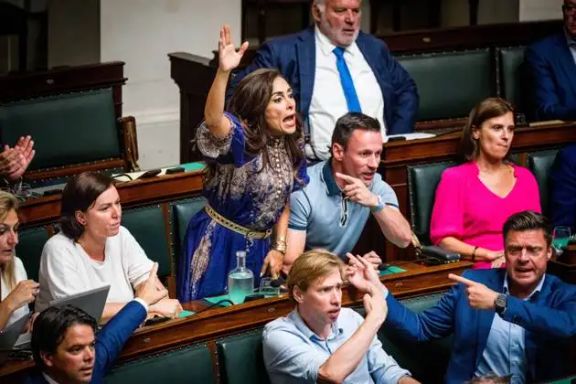
Belgian MP of Iranian descent Darya Safai announced the country’s government supports her proposal to designate Iran's Islamic Revolutionary Guard Corps (IRGC) as a terrorist organization within the EU.
Safai revealed that she submitted a resolution more than a year ago, emphasizing her persistent efforts to highlight the IRGC's activities.
"For a long time now, I have been making great efforts to convince everyone, and certainly the Belgian government, that the IRGC is a terrorist organization that belongs on the terror list," Safai wrote on social media platform X.
Belgium’s Foreign Minister, Hadja Lahbib, voiced support for the initiative on Monday. Speaking to journalists in Luxembourg ahead of an EU ministers’ meeting, Lahbib acknowledged that while there is no consensus yet on the legal basis for such a designation, the new sanctions against Iran in response to the country’s recent attack on Israel should include the Islamic Revolutionary Guard Corps.
The European Union has decided to enhance sanctions against Iran following Tehran's recent attack on Israel, a decision reached after a meeting of the bloc's foreign ministers. During a press conference in Luxembourg on Monday,
EU foreign policy chief Josep Borrell announced that the new sanctions would target Iran's missile production and expand the list of banned drone-related components. The additional measures aim to augment the existing sanctions, which were initially imposed due to Iran's role in supplying drones to Russia for its military actions in Ukraine.






